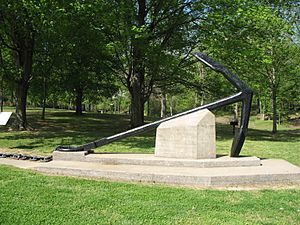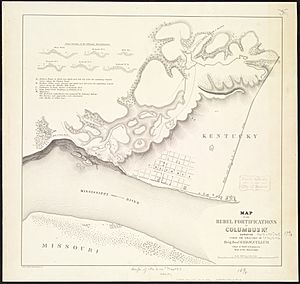Columbus-Belmont State Park facts for kids
Quick facts for kids Columbus-Belmont State Park |
|
|---|---|

Columbus-Belmont State Park Anchor
|
|
| Lua error in Module:Location_map at line 420: attempt to index field 'wikibase' (a nil value). | |
| Type | Kentucky state park |
| Location | Hickman County, Kentucky, United States |
| Area | 156 acres (63 ha) |
| Created | 1934 |
| Operated by | Kentucky Department of Parks |
| Open | Year-round |
| Built | 1861 |
| NRHP reference No. | 73000806 |
| Added to NRHP | May 09, 1973 |
Columbus-Belmont State Park is a special place in Hickman County, Kentucky, right by the Mississippi River. It's a Kentucky state park that remembers an important American Civil War fort. Both the North and the South knew how important this spot was for controlling the Mississippi River. The park honors the battles that happened here in Columbus, Kentucky, and across the river in Belmont, Missouri.
Contents
History of the Civil War Fort
In 1861, a Confederate General named Leonidas Polk started building a fort here. He called it Fort De Russey, but many people knew it as the "Gibraltar of the West." This name meant it was a very strong and important place, just like the famous rock fortress in Europe.
The Giant River Chain
General Polk had a huge chain stretched across the Mississippi River. This chain went all the way to Belmont, Missouri. Its job was to stop U.S. Navy boats and supply ships from moving up or down the river. The fort also had 143 cannons! Columbus was the most northern Confederate base on the Mississippi. It helped protect important cities like Memphis, Tennessee, and Vicksburg, Mississippi.
Saving History from Floods
Many of the fort's original dirt walls, buildings, and cannons were lost in big floods during the 1920s. The river's edge, called the bluff, washed away. When the floods went down in 1925, the giant chain was uncovered. The people of Columbus decided to save this amazing piece of history. In 1934, the state of Kentucky bought the land to create the park we see today.
Park Attractions: What to See
The park has some incredible things to explore, especially if you're interested in history!
The Famous Giant Chain
The most famous thing at the park is General Polk's giant chain. Experts believe it was once over a mile long! Floods and erosion have made it shorter, but you can still see a huge part of it. The anchor for the chain weighed between four and six tons. Each link in the chain was about 11 inches (279 mm) long. During the Great Depression in 1934, a group called the Civilian Conservation Corps built a stone monument to hold and display the chain.
The "Lady Polk" Cannon
Another cool attraction is the "Lady Polk." This was a huge, experimental cannon named after General Polk's wife. It was 10 feet (3 meters) long and weighed 15,000 pounds (6,800 kg)! This powerful gun fired 128-pound cannonballs up to 3 miles (4.8 km). It was used to shoot at Ulysses S. Grant's troops during the Battle of Belmont.
The Cannon's Fate
However, firing the "Lady Polk" many times made its metal barrel very hot and caused it to expand. This changed the shape of the barrel. Two days after the Battle of Belmont, soldiers tried to fire the last cannonball that was still loaded. Because the barrel was deformed, the cannonball got stuck. The cannon then exploded into three pieces, sadly killing 18 Confederate soldiers. A newspaper at the time joked that you'd be just as safe standing at one end of the cannon as the other!
Museum and Learning Center
The park has one old building that survived from before the Civil War. It was a farmhouse that became a Confederate hospital during the early part of the war. Today, this restored building is a museum and a learning center for the Kentucky state park system.
What You'll Find at the Museum
The museum teaches visitors about the Civil War history of the area. It also shares information about the local nature and culture. You can visit the museum every day from May through September. In April and October, it's open on weekends.
See also
 | Delilah Pierce |
 | Gordon Parks |
 | Augusta Savage |
 | Charles Ethan Porter |


